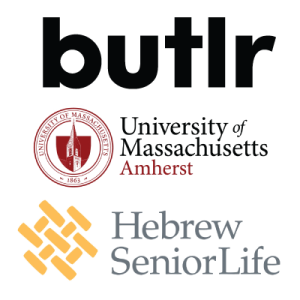- Testing a vocal biomarker platform for remote detection and monitoring of cognitive impairment in the home environment
Erik Larsen, Sonde Health. Brad Dickerson, Massachusetts General Hospital.
Bonnie Wong, Massachusetts General Hospital. The pilot project, conducted by researchers from Massachusetts General Hospital and Sonde Health, explored the use of a vocal biomarker platform to detect and monitor cognitive impairment in older adults.
- Developing real-world digital biomarkers from wearable sensors in Alzheimer’s disease
Jen Blankenship, VivoSense Inc. Michael Busa, UMass Amherst. This pilot study aimed to develop and validate new algorithms for detecting walking behavior using wearable sensors in older adults, including those with Alzheimer’s disease or mild cognitive impairment.
- Sensor-guided psychopharmacology in Alzheimer’s disease and related dementias
Ipsit Vahia, McLean Hospital.
Rachel Sava, McLean Hospital. The ADAPT pilot study explored the use of wearable sensor technology to support psychopharmacological care in individuals with Alzheimer’s disease and related dementias.
- Detecting frailty in home environments through non-invasive whole room body heat sensing in older adults
Amanda Paluch, UMass Amherst. Dae Hyun Kim, Hebrew SeniorLife. Rags Gupta, Butlr Technologies Inc. This AITC pilot project explored the use of non-invasive, ceiling-mounted heat sensors to detect frailty in older adults living in senior communities.
- Smartphone blood pressure monitoring for healthy aging
Edward Jay Wang, UCSD. The pilot project focused on developing and validating BPClip, a low-cost, smartphone-based blood pressure monitoring device.
- Vascular aging using infrasonic hemodynography embedded into everyday earbuds
Anna Barnacka, MindMics Inc. The MindMics pilot project explored the use of infrasonic hemodynography (IH) technology embedded in everyday wireless earbuds to monitor cardiovascular health and assess vascular aging.
- Early acute illness detection in delirium and dementia
Jane Saczynski, Northeastern University. Edward Marcantonio, Beth Israel Deaconess Medical Center. Acute illness presents in the most vulnerable organ in the body, among patients with dementia that organ is the brain and acute illness often presents first as delirium, an acute confusional state. This project will evaluate home monitoring devices as early indicators of acute illness in persons with dementia.
 Erik Larsen, Sonde Health. Brad Dickerson, Massachusetts General Hospital. Bonnie Wong, Massachusetts General Hospital. The pilot project, conducted by researchers from Massachusetts General Hospital and Sonde Health, explored the use of a vocal biomarker platform to detect and monitor cognitive impairment in older adults.
Erik Larsen, Sonde Health. Brad Dickerson, Massachusetts General Hospital. Bonnie Wong, Massachusetts General Hospital. The pilot project, conducted by researchers from Massachusetts General Hospital and Sonde Health, explored the use of a vocal biomarker platform to detect and monitor cognitive impairment in older adults. Jen Blankenship, VivoSense Inc. Michael Busa, UMass Amherst. This pilot study aimed to develop and validate new algorithms for detecting walking behavior using wearable sensors in older adults, including those with Alzheimer’s disease or mild cognitive impairment.
Jen Blankenship, VivoSense Inc. Michael Busa, UMass Amherst. This pilot study aimed to develop and validate new algorithms for detecting walking behavior using wearable sensors in older adults, including those with Alzheimer’s disease or mild cognitive impairment. Ipsit Vahia, McLean Hospital. Rachel Sava, McLean Hospital. The ADAPT pilot study explored the use of wearable sensor technology to support psychopharmacological care in individuals with Alzheimer’s disease and related dementias.
Ipsit Vahia, McLean Hospital. Rachel Sava, McLean Hospital. The ADAPT pilot study explored the use of wearable sensor technology to support psychopharmacological care in individuals with Alzheimer’s disease and related dementias. Amanda Paluch, UMass Amherst. Dae Hyun Kim, Hebrew SeniorLife. Rags Gupta, Butlr Technologies Inc. This AITC pilot project explored the use of non-invasive, ceiling-mounted heat sensors to detect frailty in older adults living in senior communities.
Amanda Paluch, UMass Amherst. Dae Hyun Kim, Hebrew SeniorLife. Rags Gupta, Butlr Technologies Inc. This AITC pilot project explored the use of non-invasive, ceiling-mounted heat sensors to detect frailty in older adults living in senior communities. Edward Jay Wang, UCSD. The pilot project focused on developing and validating BPClip, a low-cost, smartphone-based blood pressure monitoring device.
Edward Jay Wang, UCSD. The pilot project focused on developing and validating BPClip, a low-cost, smartphone-based blood pressure monitoring device. Anna Barnacka, MindMics Inc. The MindMics pilot project explored the use of infrasonic hemodynography (IH) technology embedded in everyday wireless earbuds to monitor cardiovascular health and assess vascular aging.
Anna Barnacka, MindMics Inc. The MindMics pilot project explored the use of infrasonic hemodynography (IH) technology embedded in everyday wireless earbuds to monitor cardiovascular health and assess vascular aging. Jane Saczynski, Northeastern University. Edward Marcantonio, Beth Israel Deaconess Medical Center. Acute illness presents in the most vulnerable organ in the body, among patients with dementia that organ is the brain and acute illness often presents first as delirium, an acute confusional state. This project will evaluate home monitoring devices as early indicators of acute illness in persons with dementia.
Jane Saczynski, Northeastern University. Edward Marcantonio, Beth Israel Deaconess Medical Center. Acute illness presents in the most vulnerable organ in the body, among patients with dementia that organ is the brain and acute illness often presents first as delirium, an acute confusional state. This project will evaluate home monitoring devices as early indicators of acute illness in persons with dementia.